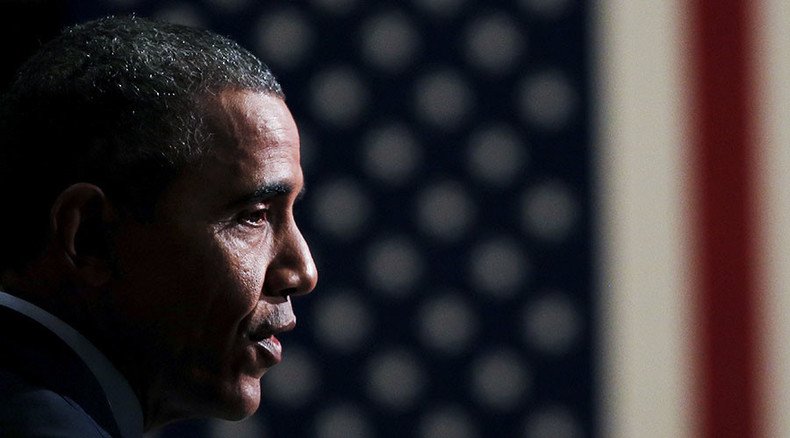'US Congress must pull the plug on Obama’s failed strategy in Syria'

The people in Washington imagine how the Middle East works, but it is not related to reality at all, says Karen Kwiatkowski, retired US Air Force lieutenant-colonel.
Assistant Secretary of State for Near Eastern Affairs Anne Patterson at a House Committee hearing to brief lawmakers on November, 4 admitted that some of the so-called moderate rebels in Syria have been recruited by the Al-Nusra Front.
RT: In light of this admission from the State Department, do you expect the US to rethink its support for the so-called moderate rebels in Syria?
Karen Kwiatkowski: It doesn’t appear that they want to rethink it. Being that we sent troops and probably more troops will come. What I am hoping is that Congress will rethink it for them. I think the administration is not willing to admit some mistakes that it’s made. But the Congress itself – there is no legal authorization for troops to go into Syria without permission, this is illegal – Congress is not being consulted and asked and they had not approved it. So, the president is acting out of bounds. And so, we can only hope that this briefing to our Congress will spark some activity on their part to rein this in. But I don’t see that the State Department is changing its position necessarily on the moderate rebels.
This morning, Asst. Sec. Patterson testified before @HouseForeign on situation in #Syria and #Russia's involvement. https://t.co/SjNYgpqAlc
— Department of State (@StateDept) November 4, 2015RT: Russia has repeatedly asked the US for closer coordination in the fight against Islamic State. Why do you think Washington is unwilling to work with Moscow in Syria?
KK: It seems like it is simply a matter of pride or lost face. They don’t want to lose face, they don’t want to look like they are taking orders or responding in a positive way to what Russia has decided to do. I can’t think of any other reason why they wouldn’t share that type of information, unless the information that we have is really not reliable. And given our coordination with these rebels, we don’t know who we are working with. Our information may not be very good at all, and maybe we don’t want that to be found out. I just don’t know; it is a mystery.

RT: President Obama last week announced he would send around 50 Special Operations troops to Syria to train and assist "moderate" rebels. How can they be sure these rebels will not also join the terrorists?
KK: I’m positive that we have no idea. I think in some ways this very quiet briefing to Congress by Ms. [Anne] Patterson - this didn’t make mainstream media here today or yesterday in the US. So, this is not something we are talking about to the American people. I think maybe they are paving away to withdraw from supporting any of these rebels in a way that will kind of be under the radar so that President Obama will not get criticized for past stupidity. So, that is the only thing I could think of. They are trying to save face that’s why they won’t work with the Russians. And clearly our policy, our strategy working with what we considered to be ‘moderate’ rebels, was wrong, it wasn’t working and it never worked. And it is going to be put to an end. But they are going to make Congress do it; they are not going to do it themselves. They are going make Congress act.
Double standards, demonization of Russia made Middle East worse – US lawmaker https://t.co/TLtIUBp5Swpic.twitter.com/yMSF1w9BKy
— RT (@RT_com) November 5, 2015RT: Do you think the US has a clear strategy for Syria and if so, what is it?
KK: I think the strategy is confused. The people in Washington have imagined how the Middle East works that it is really not related to reality at all. It is unrealistic. And they are trying to put forth things - the military doesn’t want to say no. Because the militaries always are militaries – they want to show you how they can do the job that you are asking them to do.
John Wight, writer and political analyst, shared his opinion on so-called ‘moderate’ rebels in Syria: "This is effectively what Victoria Nuland is trying to maintain because what has happened with Russia’s intervention is the entire edifice of US policy towards Syria and the Syrian conflict has collapsed. There is no such thing as a ‘moderate’ rebel in Syria… and we know this because even from within the Defense Intelligence Agency review documents made clear that by the beginning of 2012 the Syrian opposition was dominated by Salafists and that domination has only been growing since then".
So, we have a crisis in Washington that plays out in a very confused strategy that is not working in Syria and in the rest of the Middle East. But it is not being addressed by anybody who has an interest in fixing it. Obama wants it not talked about; he wants this quiet and very under the table. Congress up to this point has not been interested. I can only hope that after these elections that we’ve just had – not Congressional elections but there’s have been governor elections – we are getting ready to go into a presidential election season next year. We have a new speaker of the House. And the House is where this activity needs to take place. They are the ones that fund and control whether they actively control it or passively control it – they are the ones that control our military activities abroad, particularly in these elective situations where the president chooses to do this or that - in this case very illegally.
So, I am thinking that you are going to see something out of Congress, because we, as Americans, are embarrassed by this – this is an embarrassing situation. Obama is embarrassed, the State Department sounded quite embarrassed when they briefed Congress. I think we are looking at somebody taking some action. Again, our Congress has to pull the plug on this failed strategy if you can even call it a strategy in Syria.
LISTEN MORE:
The statements, views and opinions expressed in this column are solely those of the author and do not necessarily represent those of RT.












